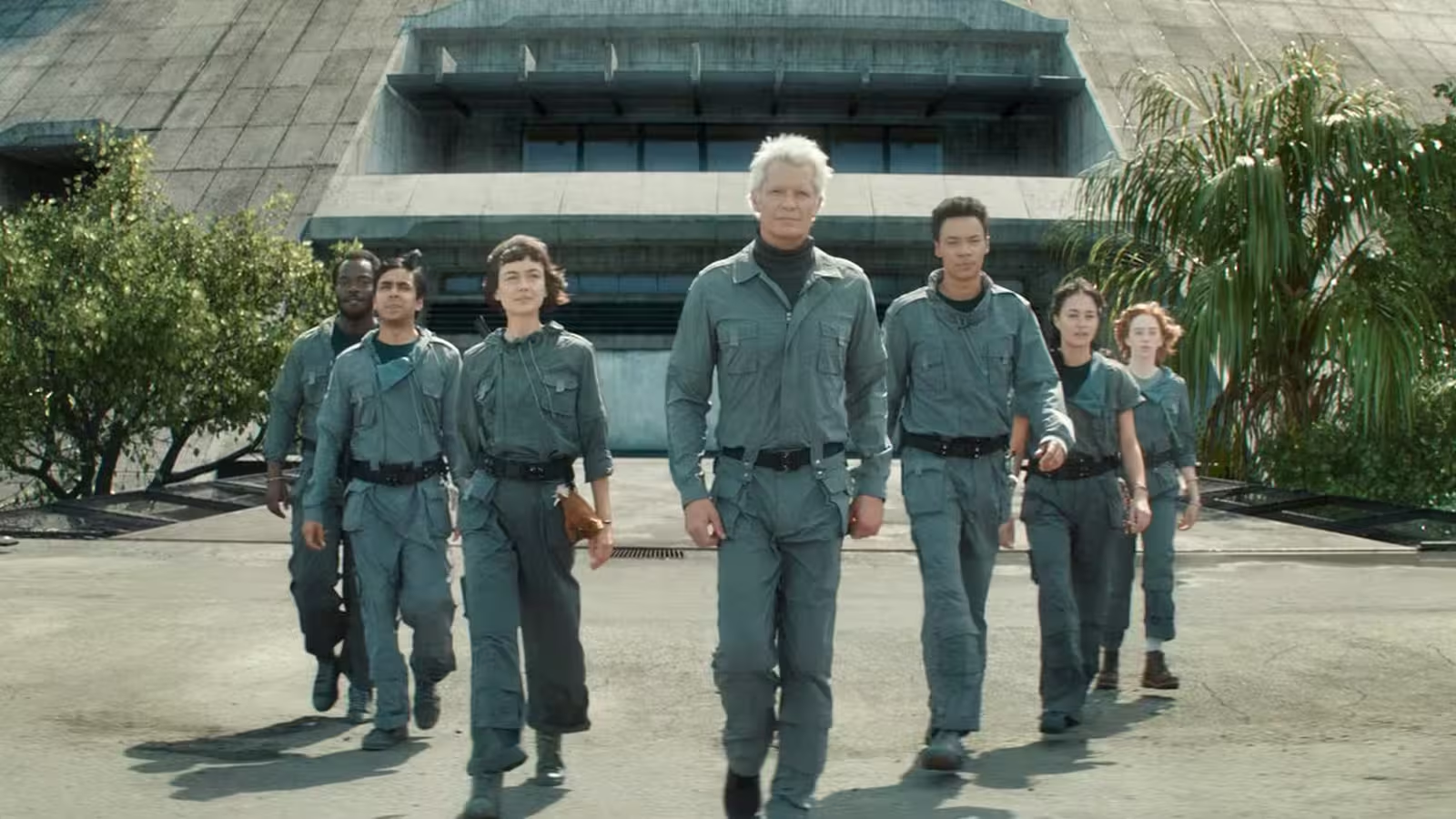9 Minutes
The new face of the Alien mythos
Noah Hawley’s Alien: Earth opens with a provocative title card: "The race for immortality will come in three guises." It’s a crisp dramaturgical promise that the series delivers on in its first two episodes, reframing familiar franchise ideas—artificial intelligence, corporate hubris, and biological horror—into a contemporary meditation on identity, ethics, and technology. For fans and newcomers alike, Alien: Earth doesn’t simply repeat the old beats from Ridley Scott’s universe; it expands the vocabulary of what makes someone human, or something terrifyingly like it.
Three guises: an overview
Alien: Earth sets up a triad—synths, cyborgs, and hybrids—each representing a different pathway toward human enhancement and the pursuit of longevity. Rather than presenting these categories as sterile sci-fi jargon, the series uses them to interrogate corporate power, grief, and the human impulse to escape mortality.

Synthetics: efficient, inscrutable, familiar
Synthetics (or "synths") are the android workforce of the universe: built for profit, endurance, and tasks that humans either can’t or won’t do. The show makes clear that synths are physically superior—faster, more durable, and cost-effective for multi-decade space missions. They recall classic franchise figures like Ash (Ian Holm) and David (Michael Fassbender), but Hawley places synths in a broader corporate ecology: not only does Weyland-Yutani produce them, but so does Prodigy, which adds a new commercial competitor to the world-building.
Synths are presented as self-aware machines programmed to mimic human behavior. They can simulate emotions convincingly, yet their interiority—if it exists at all—remains computational. That distinction fuels philosophical tension: when a synth demonstrates loyalty or sorrow, is it performance or personhood?

Cyborgs: human continuity with mechanical appendages
Cyborgs are a quieter but pivotal addition to Alien lore in Alien: Earth. Represented by Morrow (Babou Ceesay), a lone survivor of an older deep-space mission, cyborgs are human bodies augmented with cybernetic parts. Where synths are manufactured beings, cyborgs are still fundamentally human, extended by machinery.
Morrow’s enhancements grant him superhuman strength and weaponized capabilities—practical, visceral, and evocative of classic sci-fi cybernetics. But because Morrow’s mission priorities remain corporate rather than humane, his presence also recalls the series’ persistent critique of mega-corporations prioritizing specimens over people.
Hybrids: the series’ most unsettling innovation
The hybrid concept in Alien: Earth flips familiar expectations. Past franchise hybrids tended toward biological grotesquery—a melding of human and xenomorph DNA that produced abominations. Hawley’s hybrids are different: human consciousnesses (in practice, the minds of terminally ill children) transplanted into synthetic bodies. Prodigy Corp’s "Neverland" facility becomes a chilling crucible where identity, exploitation, and the desire for immortality intersect.
These hybrids possess technopathic abilities—they manipulate hardware and networks with thought—and they inhabit invulnerable exoskeletons that outwardly resemble synths. The key difference is inward: the hybrids are human minds in machine shells, capable of genuine emotional response and psychological continuity. Characters like Wendy (Sydney Chandler) lead a group of renamed children—Tootles, Slightly, Curly—who navigate a new, disorienting existence while Prodigy’s executives rationalize the experiments.

Why Alien: Earth matters: themes and franchise continuity
Hawley’s show is both sequel and reinvention. It references franchise touchstones—Weyland-Yutani corporate machinations, the xenomorph mythos—while expanding the moral scope to include the ethics of transferring consciousness and the commodification of terminal illness. The decision to use children as the initial test subjects is narratively charged: it heightens the horror and raises urgent ethical questions about consent, corporate cover-ups, and the lengths companies will go to for a shot at immortality.
Thematically, the series sits alongside science-fiction dramas exploring identity and AI, such as Westworld and Blade Runner. It also echoes the philosophical stakes of The Terminator and The Matrix—humanity’s fight against systems that can supersede or replace it—while remaining distinctively Alien in its attention to biological threat and corporate malfeasance.
Performance, direction, and world-building
Alien: Earth benefits from an ensemble cast that lends the corporate and scientific machinations a human center. Timothy Olyphant’s Kirsh and Samuel Blenkin’s Boy Kavalier provide contrasting visions of corporate paternalism and technocratic ambition. Babou Ceesay’s Morrow is a tragic, almost anachronistic figure whose cyborg enhancements are relics of an earlier technological era, which creates compelling tension against Prodigy’s sleek synths.
Noah Hawley—known for sharp tonal control in Fargo and the surreal ambition of Legion—brings a layered mix of dread and dark humor to the series. Fans may notice visual nods to Ridley Scott’s aesthetics, but Hawley’s tempo and character-driven approach make Alien: Earth feel like its own creature.
Context, cultural impact, and industry trends
Alien: Earth arrives at a moment when mainstream TV is especially receptive to dense, serialized sci-fi that interrogates technology’s moral costs. The show taps into anxieties about AI ethics, data ownership, and the growing role corporations play in shaping intimate aspects of life—topics that resonate in an era of real-world AI breakthroughs and biotech debate.
From an industry perspective, the series represents a major streaming-era play: leveraging a beloved IP to support auteur-driven television. It’s an example of how established film franchises can be reinvented for serialized storytelling, allowing for slow-burn philosophical plotting that theatrical films rarely accommodate.
Trivia & fan notes
- The show uses the Peter Pan motif (Neverland, Lost Boys) to perversely frame corporate paternalism as both fantasized salvation and sinister control.
- Fans have pointed out that the hybrids’ technopathy visually echoes earlier franchise experiments with body horror while shifting the moral register toward identity politics.
"Noah Hawley uses genre as a mirror. Alien: Earth is less about jump scares and more about how corporations reimagine family, memory, and survival," says cinema historian Marko Jensen. "This series smartly reframes the franchise’s paranoia into a meditation on who gets to live forever—and at what cost."
Critique: ethics, pacing, and unanswered questions
Alien: Earth invites applause for its ambition but also a few critiques. The moral stakes are high, and while the slow-burn plotting builds tension, some viewers may want clearer exposition about the technical mechanics of consciousness transfer. The use of children as test subjects is narratively wrenching—and deliberately so—but it also risks veering into shock for shock’s sake if the series doesn’t follow through on accountability and consequence.
The show’s greatest success is its willingness to ask uncomfortable questions: If a human mind is preserved in a synthetic shell, is that person still human? Who owns identity once consciousness becomes a transferable commodity? These questions are the engine of the drama and keep the series anchored in philosophical urgency rather than merely spectacle.
Where this fits in the Alien timeline and how to watch
Alien: Earth sits alongside prequels and sequels as a reinterpretation rather than a strict chronological continuation. It borrows franchise lore—corporate empires, xenomorph research—and layers new technological and ethical crises on top. The first two episodes of Alien: Earth are available to stream on Hulu, with new episodes released weekly.
Final thoughts: what the series promises
Alien: Earth is both a love letter and a sharp critique of the franchise’s central obsessions—immortality, exploitation, and the uneasy boundary between human and machine. By introducing hybrids as human minds in synthetic bodies, the series advances the conversation about consciousness in a way the films rarely had the runtime to explore. The result is unsettling, intellectually provocative television that asks viewers to reconsider what it means to be alive.
Whether you come for the scares, the world-building, or the ethical puzzles, Alien: Earth stakes a compelling claim: the future of the franchise will not simply be about monsters in the dark, but about who controls the light.
Conclusion
As the series unfolds, watch for how Alien: Earth balances spectacle with philosophical stakes. Its new hybrid concept is a powerful narrative lever—one that could reshape franchise debates about personhood and corporate accountability. If Hawley keeps steering the show toward character-driven inquiry rather than pure shock, Alien: Earth may become one of the most thoughtful entries in the Alien canon.
Source: collider


Leave a Comment